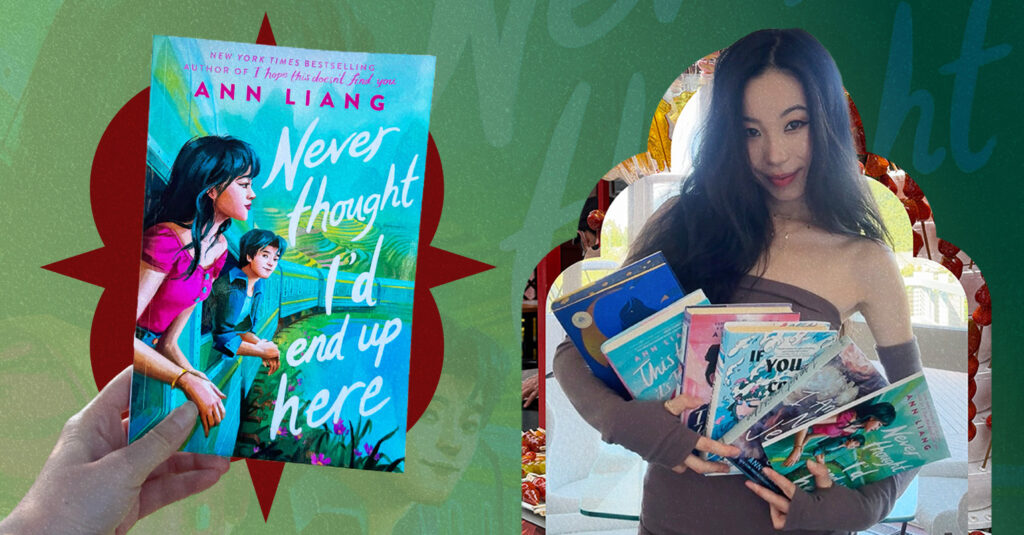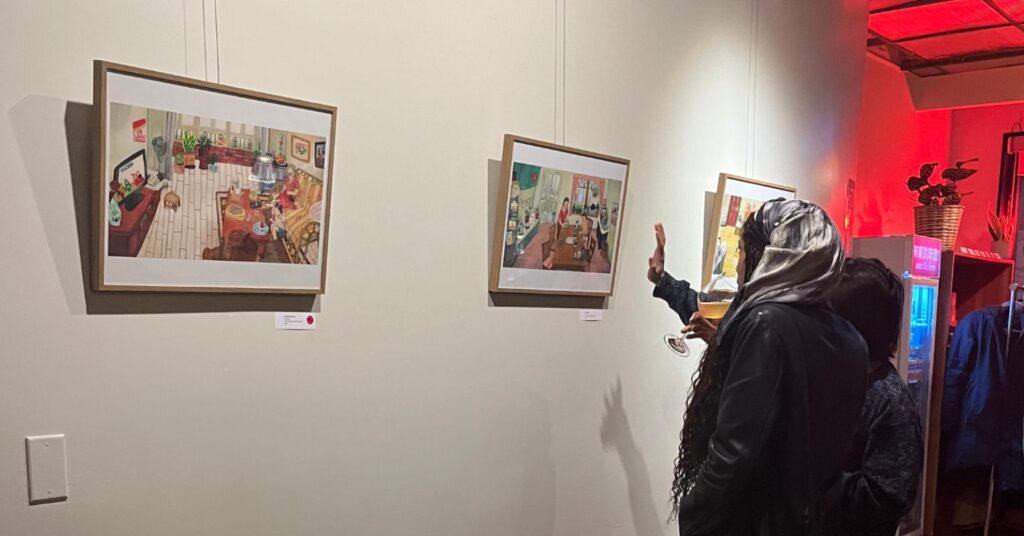Creative Spotlight: Yao Xiao on Evoking Nostalgia Through Writing

For Women’s History Month, EnVi shows extra love to women across the Asian diaspora and beyond, with special features in Fashion, Beauty, Music, Film, and Culture.
Where art meets writing and settles down in a quaint studio in Midtown Manhattan, Yao Xiao’s creative mind is able to run free. Xiao is a cartoonist and illustrator from Tianjin, China and is based in New York City. Much of her work reflects inner thoughts and complex experiences she has faced. Her walls are embellished with old work as well as newer projects. Memories flutter around her workspace, from smiley pictures of her and her friends to written letters compiled on a pin board.
It’s no wonder nostalgia comes up for Xiao– she has made a resting place for herself, to allow her to open up Pandora’s box. EnVi had the pleasure of speaking with Xiao in her studio about exploring writing as a method of self expression.
Early Journey In Art
Drawing came naturally to Xiao from a young age; it was something she did without much thought. It wasn’t until she read an old Chinese graphic novel named Zhang Yu Liang Zhuan (The Story of Zhang Yu Liang) when she realized pursuing art was a career option.
The novel follows a woman named Zhang Yu Liang from China who moved to Paris to study painting. She taught herself painting from books and furthered her studies in art by attending an art academy, Xiao explained. The woman went on to participate in art shows, and have her own exhibitions, and even had a studio to do her art. “I think it gave me an idea of how someone can take this path,” Xiao said, recounting the contents of the story.
Much like Yu Liang, Yao Xiao came to New York City from China as a high school student and soon after went to the School of Visual Arts to pursue art and illustration. Following a similar path as Yu Liang over the years, Xiao has been active in art shows and festivals, showcasing her art and comics, and now has her own studio space for work.
Storytelling Through Illustration And Writing
Through illustration and comics, Yao Xiao has been able to dive into deep introspection and create a world where she can visually work out complex concepts and emotions. This ranges from deeper moments like Drawing Grief to something as subtle as watching dust particles float between a shaft of light during childhood.
“[For visual work] there’s a comic I’m working on that’s about language and belonging,” Xiao told EnVi. She referred to her latest comic called No Word Island, which made its debut at SI MoCCA Arts Fest 2024 in New York City.
“When I do visual [work], it’s like an abstract feeling that is hard to put into words and I want it to be a visual work because that’s a feeling that I have that is not analytical for me.” Xiao said. No Word Island is one of many works done that touches on an experience Yao Xiao has gone through. With language playing a big role in life– living in an English speaking country and having all of her family back in China– this comic spotlights the aspect of having to translate yourself in order to be understood.

“It’s really freeing to make a work that is about speaking a language and being bilingual that is part visual because […] that’s the language that has never stopped for me. There’s no break.”
“Baopu” is another one of Xiao’s comics where she dives into searching for connection, belonging, and identity through the character Baopu, a young, queer immigrant. Xiao took this ongoing series to the next level and created her first graphic novel called “Everything Is Beautiful, and I’m Not Afraid .” Her comic work also extends into Buzzfeed, The New Yorker, and more.
From reading fiction to memoirs, Xiao has always had an interest in writing and has written only for herself. “I always wanted to tell my story,” Xiao said. However, it was a while until she felt ready to share her writing and thoughts with the world.
“Because English was my second language, it was very hard to build that confidence to say that what I’m writing is a piece of work that can be shared and it’s not just my personal journal,” Xiao admitted, tying it back to her comic No Word Island.
In 2021, Xiao attended graduate school at Hunter College for her MFA in Creative Writing. It was during this time when she started developing her current untitled project: a book of essays exploring a central theme of nostalgia.
Capturing Fuzzy Memories
After taking steps towards sharing her writing, she opened a door to new ways of conveying her thoughts.
“I discovered that my process between writing and drawing have a lot of similarities […] I can go back and forth with them and it doesn’t diminish my skills with them when I return,” Xiao shared. She continued, saying, “I really like that alternating—turning on different parts of my brain.”
Xiao told EnVi about her process of deciding whether to turn a project into something visual versus into an analytical writing piece. First, she lets old memories, experiences, and anything notable emerge as fuzzy images. From there, she figures out if drawing a comic or writing an essay will best portray them.
Xiao alluded to an essay she wrote called “The Old House” as an example, published in the magazine Passages North and will also be in her book of essays. Her grandmother’s house, which she described as “a house in the countryside and is disappearing,” came to her as a fuzzy image. With fond memories surrounding this image, she discerned that a visual of the house would not be able to fully capture its essence.

“It feels like the way I draw won’t be enough to represent what it was to me.” Xiao conveyed. “It maybe captures something in the moment but I don’t feel like that’s the portrait of the place.”
Writing about it only felt right to Xiao. She was able to maintain the image of her grandmother’s house in her head and immortalize it onto paper in writing.
Fond And Tender Nostalgia
When Yao Xiao started writing her book, she originally wanted to write a memoir on her journey of becoming an artist, but realized she wanted to write about the memories of her family and her life in China that were tender to her.
“I really wanted to reach the kind of emotion I feel when I think about them so that really became the idea behind this book of essays,” Xiao said fondly. “To really organize […] me recounting the life I didn’t continue in China but without moving on from it, so I said the book was about nostalgia.”
The opposite of a tender moment, but something that has imprinted on Xiao, is one of her favorite essays she’s written: “How Long Does It Take To Disappear.” It was featured in the magazine f(r)iction and will be included in her book. She wrote about witnessing a complete decay cycle of a hedgehog she rode her bike past everyday to school until it became nothing.
“I think that was the most complete process I had seen this happen,” Xiao laughed as she followed up by saying it had potential to be a “spectacle” and disgusting if she had made it into a comic. She did not want it to come off as such. It was a piece she wrote to process how nature and her city life coincided in that moment.
“This essay is currently my favorite because it’s just describing how things are… I was able to discuss these things that are otherwise abstract to me.” Xiao said.
By writing, Yao Xiao has been able to capture her feelings of nostalgia and remembrance in a way she can process and cherish.

Voyage Into the Past
Xiao explained how writing about nostalgia often feels like looking through a window “to see a version of the past.” The past, like the present, is multifaceted and complicated as if it’s coexisting now with the present, in not only herself but in many people’s memories. Though it’s easy to stay stuck in the past, she chooses to look back with positive feelings.
“For me I’m really trying to make a connection so I can take what I received from that time and move on with those things,” Xiao said. “I realized I can’t take everything. I think having that realization really prompts me to work on this book right now.”
When sitting down to write a draft, Yao Xiao harnesses strong emotions about the experience or thought she is going to write about. She feels very attached to her pieces but makes sure to revise it with a different mindset. The editing process helps her feel present when writing about past experiences.
Looking Ahead
Xiao has a lot in store for the progress of her book. She was recently accepted as a MacDowell fellow, an artist residency program for creatives. She aims to continue deeply working on “central themes of her essays,” as well as exploring different forms. Xiao is also looking forward to developing new ideas for upcoming projects as well as diving back into visual work.
“While I can’t share a specific timeline, I hope to have this book finished and meet the readers as soon as possible,” Xiao mentioned. She hopes to continue to foster connections and touch her audience through her work.
You can support Xiao and keep up with the progress of the book on her Instagram as well as her website!
Interested in illustrations inspired by Chinese traditions? Read our interview with children’s book illustrator Stella Hong here!



